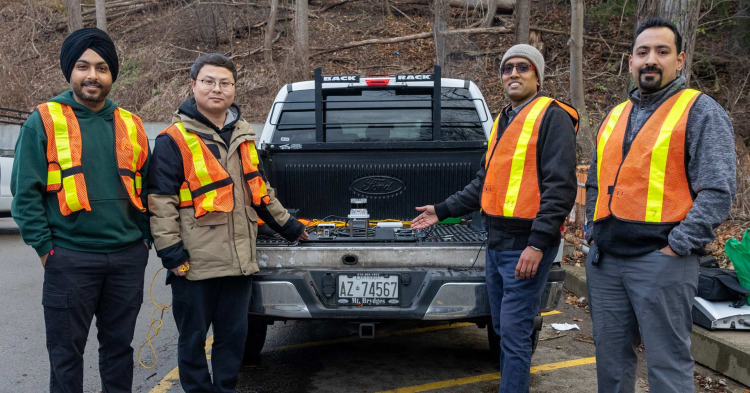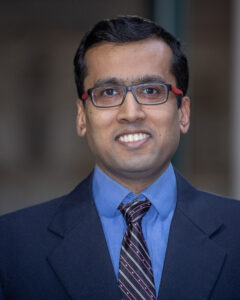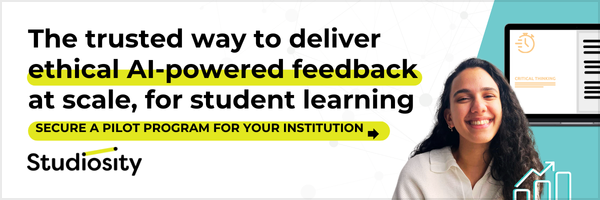'Work smarter, not harder' aren't just words to live by for Western engineering professor Ayan Sadhu.
For Sadhu, Canada Research Chair in Smart and Sustainable Civil Infrastructure, it's how cities like New York, Singapore and Seoul grew to become global hubs for economic, cultural and political excellence and how smaller centres like London, Ont. can continue to advance.

Postdoctoral scholar Premjeet Singh, postdoctoral scholar Liangfu Ge, Western engineering professor Ayan Sadhu and Smart Cities and Communities lab supervisor Mohamed Barbosh (L to R) outfitted a university vehicle with an arsenal of lidars, cameras and internet-of-things (IoT) sensors to run a series of tests across campus, investigating everything from road conditions to air quality. (Alex Sanromán/Western Communications)
Sadhu and a team of engineers and computer scientists have developed technologies to assess damage and degradation of existing infrastructure in cities, which can ultimately influence key decisions on maintenance, rehabilitation or even demolition. Driven by artificial intelligence and machine learning, these data-to-decision' tools include aerial and underwater drones, augmented reality glasses, lidars and high-speed cameras.
And now they're testing the approach right on Western's campus.
Sadhu and his team are investigating roads and buildings across campus with an urban scanning framework as part of their Campus as a Living Lab initiative. The project aims to pilot and perfect new technologies, not only to maximize sustainability at Western, but also to gather valuable information for staff in Facilities Management and other potential partners, like the City of London.
"When you say, smart city,' there are infinite combinations and possibilities. There are challenges, too, from infrastructure and communications to housing and health care," said Sadhu, civil and environmental engineering professor and director of the Smart Cities and Communities (SCC) Laboratory. "We're looking at one aspect - and it's a big one - how can we make city infrastructure better in terms of inspection, construction, traffic, transportation and sustainability."
Western's campus a 'living lab'
This winter, Sadhu, his postdoctoral scholars Liangfu Ge and Premjeet Singh and SCC lab supervisor Mohamed Barbosh outfitted a university vehicle with an arsenal of lidars, cameras and internet-of-things (IoT) sensors to run a series of deployment tests. They measured and live monitored campus infrastructure such as road conditions and pavement quality, while testing atmospheric composition, like temperature, humidity and air quality.

Ayan Sadhu
City of London staff took part in some of the tests to observe how these technologies could potentially be used by various city services, including environment and infrastructure planning and economic development.
"When a person is experiencing difficulties with their hip, the decision needs to be made whether to replace it or do physical therapy," said Sadhu. "That what this project is doing for cities. It's called structural health, and we use artificial intelligence and big data to strengthen the decisions we make."
Sadhu said significant developments in non-contact data collection technology - gathering information without physical interaction - over the past few years have helped improve inspections in extreme climates, such as Canada, without disrupting regular maintenance.
"If you wanted to assess a bridge or highway for repair and restoration, in the past, you would place sensors all over it, which takes a lot of time and money because of its large scale," said Sadhu. "To do it correctly and accurately, you need to close the bridge and hire cranes. It's a big deal with a lot of people involved, which impedes progress and requires time-intensive detouring. What we are trying to do is address these needs with non-contact inspection methods that are faster, smarter, more robust and can be conducted in real-time, free of closures - resulting in low-cost solutions."
Understanding the risks
The concept, creation and delivery of the project was designed over the past year as Sadhu led an interdisciplinary research theme at Western Academy for Advanced Research to address "technical and social barriers in smart cities and communities."
Despite their advantages, smart cities also present some risks. For example, ethically managing citizen data is a crucial, pressing issue.
To tackle these societal concerns, Sadhu collaborated with electrical and computer engineering professor Abdallah Shami, who investigates AI, cyber-security and autonomous vehicles, and Faculty of Information and Media Studies professor Anabel Quan-Haase, a leading expert in computer-mediated communication, new media and social change and digital activism. The project also involved international academic partners, including Katharine Willis from the University of Plymouth in the U.K. and Jalel Ben-Othman from the Université Sorbonne Paris Nord in France.
"Working with industry partners, policymakers, advocacy groups and academics from around the world, we want to help communities, and their leaders create a blueprint for an ethical, technologically-driven future," said Sadhu.










